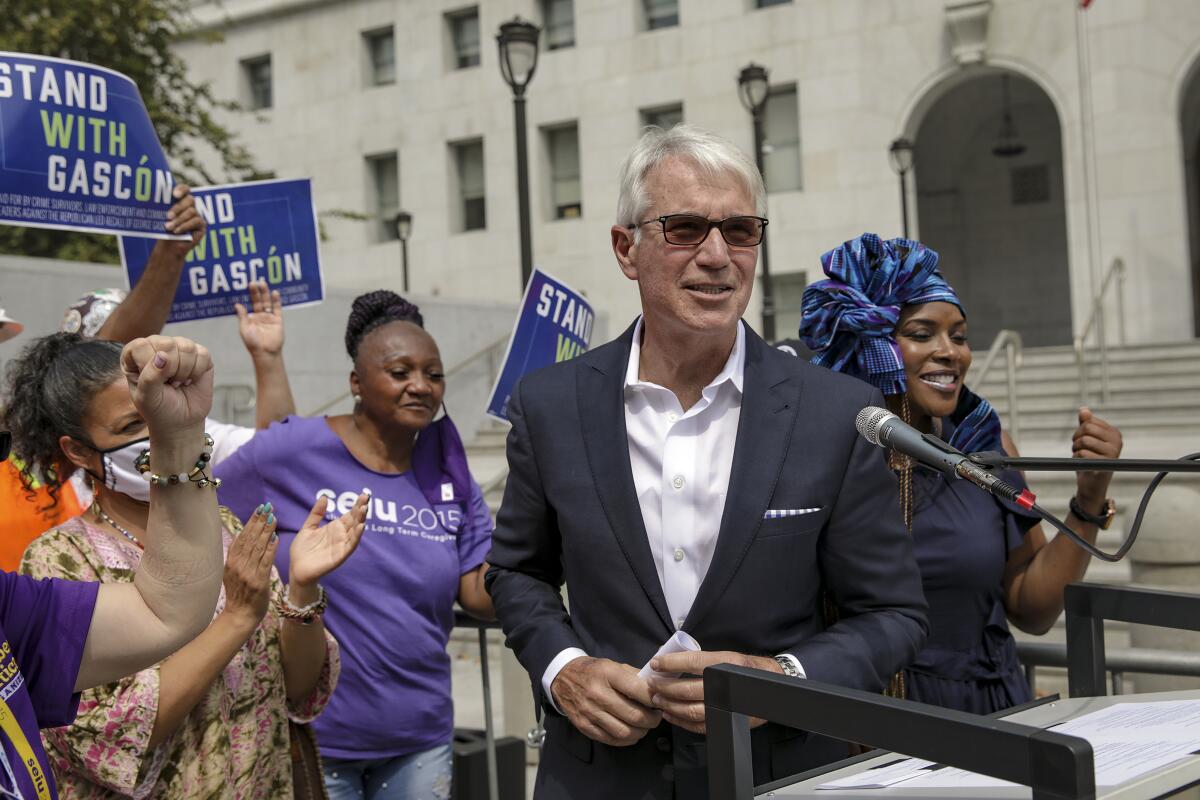L.A. County D.A. to dismiss 60,000 past marijuana convictions

- Share via
The nation’s largest prosecutor’s office is moving to dismiss roughly 60,000 marijuana convictions, the latest step to undo what some reform advocates consider the damage caused by narcotics enforcement carried out before Californians voted to legalize marijuana, Los Angeles County Dist. Atty. George Gascón announced Monday.
Under previous Dist. Atty. Jackie Lacey, the office moved last year to dump 66,000 marijuana convictions that took place before voters passed Proposition 64, the state law legalizing recreational marijuana use. But that list was compiled using information collected by the California Department of Justice, and Gascón said his office was able to identify tens of thousands more eligible cases by combing L.A. County court records.
“Dismissing these convictions means the possibility of a better future to thousands of disenfranchised people who are receiving this long-needed relief,” Gascón said in a statement. “It clears the path for them to find jobs, housing and other services that previously were denied to them because of unjust cannabis laws.”
Gascón has long championed efforts to reverse what he sees as the racially disparate and overly punitive effects of the nation’s war on drugs. While serving as San Francisco’s top prosecutor, he sought the dismissal of nearly 9,000 felony and misdemeanor marijuana convictions that were processed before the passage of Proposition 64. As part of that effort, Gascón partnered with nonprofit tech organization Code for America, which developed an algorithm to analyze county data and identify cases eligible to be cleared under Proposition 64.
About 20,000 of the convictions expected to be expunged under Gascón’s Monday order were for felony possession or cultivation of marijuana, said Jean Guccione, a spokeswoman for the L.A. County district attorney’s office. The remainder were misdemeanors filed in jurisdictions that do not have their own city attorney’s offices, she said. It was unclear how far back the case review went, but while in San Francisco, Gascón had sought to overturn cases dating to the mid-1970s.
Dist. Atty. Jackie Lacey announced the dismissal of 66,000 marijuana convictions in L.A. County, a move that undoes decades of drug enforcement.
Felicia Carbajal, executive director of the Social Impact Center, a Los Angeles-based community center, said her organization first helped identify the discrepancy in Los Angeles County’s handling of case expungements, noting the potential problem with relying solely on California Department of Justice records to identify cases that would qualify for relief.
Carbajal said she contacted Lacey’s staff about the problem last year, but ultimately nothing was done. But when taking part in a panel discussion around cannabis enforcement that took place on April 20 this year, Carbajal said, she met former public defender Tiffiny Blacknell, who now serves as a special advisor to Gascón. Their conversation jump-started the process that led to Monday’s announcement, Carbajal said.
On Monday, Lacey said Carbajal did not contact the district attorney’s office about the discrepancy. Lacey said that under her administration, prosecutors had identified the additional cases Gascón moved to dismiss Monday, but was waiting to ensure each case on the list was truly eligible for dismissal under Proposition 64. She believed the process of dismissing the cases was still pending when she left office last year after losing to Gascón in her bid for a third term.
Gascón said he also plans for prosecutors to work with the public defender’s office to seek a “blanket” court order to seal records of the convictions for the thousands of defendants affected by the move.
“Over 100,000 Angelenos have been impacted by this war on marijuana after the voters told us they overwhelmingly wanted to stop this.… We want to basically erase the harm,” he said.
Under a state law that went into effect in January 2019, the state Department of Justice was required to identify all cases eligible for dismissal or resentencing under Proposition 64. But Carbajal said the pursuit of such remedies has been slow going in some parts of the state, and it became increasingly difficult to get hearings on court calendars as the COVID-19 pandemic ground many court systems to a halt.
San Francisco will retroactively apply California’s new marijuana legalization laws to prior convictions, expunging or reducing misdemeanor and felony convictions dating back to 1975, the district attorney’s office announced Wednesday.
Carbajal said it frustrated her to see cannabis dispensaries and growers rake in massive profits after the passage of Proposition 64, while clients who had been convicted of marijuana offenses before the law was enacted often struggled to find housing or employment because of their past punishments for possession of a now-legal drug.
“My goal with all of this was really to try to put myself out of work,” she said. “We do expungement work once a month, I’m looking around across the city and how long this is taking and how much money we continue to see raked in by the cannabis industry, and it still doesn’t sit well with me until those records are actually expunged.”
More to Read
Sign up for Essential California
The most important California stories and recommendations in your inbox every morning.
You may occasionally receive promotional content from the Los Angeles Times.












